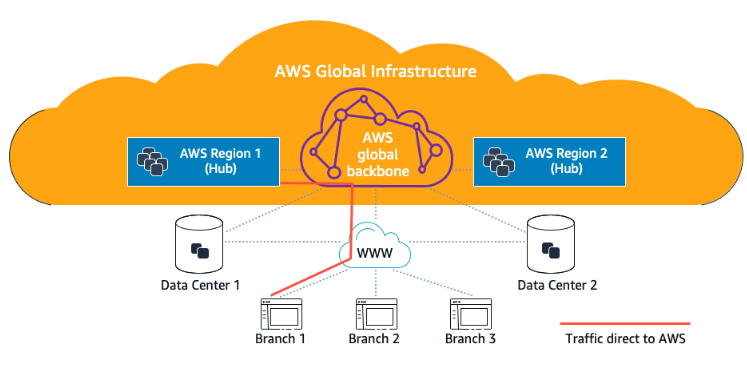Cloud Networking Services Available
Virtual Private Networking ( VPN ) In the Cloud:
Setting the VPN services within the cloud environments helps for securing remote access and transfer the data.
Hub and Spoke Network Topology:
Establishment of Hub and spoke technology helps in centralizing the traffic management and in optimizing the resource utilization.
Sofftware-Defined Networking (SDN):
On usage of SDN technologies facilitates in dynamically manage and configure the network infrastructure in cloud environments for improving agility and scalability.
Benefits of Cloud Networking
Cloud computing offers on-demand, self-service access to applications and resources like storage and virtual machines, enabling users to scale and pay based on usage. It provides high scalability, agility, and efficient resource sharing across multiple users, all while minimizing costs. The services are reliable, highly available, and accessible remotely, with minimal maintenance required. Additionally, clients can access resources through APIs and pay-per-use models, ensuring flexibility and cost-effectiveness.
On-Demand Self Service:
Cloud computing provides required application, services, and utility to client. With login key, they can begin to use besides any human interplay and cloud service providers. It consists of storage and digital machines.
High Scalability:
It requests grant of resources on large scale besides any human intervention with every service provider.
Agility:
It shares the assets efficiently amongst customers and works quickly.
Multi-sharing:
By distributed computing, distinctive clients from couple of areas share identical resources through fundamental infrastructure.
Low Cost:
It is very economical and can pay in accordance with its usage.
Services in pay per use Model:
Application Programming Interface is given to clients to use resources and offerings and pay on service basis.
High availability and Reliability:
The servers are accessible at the proper time besides any delay or disappointment.
Maintenance:
Maintenance: It is user-friendly as they are convenient to get entry to from their location and does not require any installation set up.
Reason To Think Cloud Networking
Enhanced Connectivity And Flexiblity:
Cloud Networking provides seamless connectivity between on-premises and cloud environments by offering flexibility to access resources from anywhere, anytime and from any device.
Improved Security and Compliance:
Proper implementation of cloud networking solutions and security measures helps in encryption and access controls with ensuring protection of sensitive data with regulatory requirements.
Cost Efficiency And Scalability:
Cloud Networking supports organizations to scale their network infrastructure as per their needs. It provides cost effective solutions for both small and large enterprises.
Multi Cloud Networking
Interoperability
Traffic Distribution
Security and Compliance
Hybrid Cloud Networking
Integration Of Environments
Data Mobility
Why Cloud Networking?

Cloud Networking is popular for its fast, reliable, and cost-effective delivery, enabling seamless data transmission for businesses like ISPs, e-commerce, and community operators.
SD-WAN uses virtualized networking to connect devices, offering advanced features like cloud optimization, secure data access, and firewalls on a centralized platform.
- Cloud networks enhance scalability, provide high-end monitoring, secure traffic flow, and ensure reliable bandwidth with centralized management for cloud services.
SD-WAN improves network performance with load balancing and analytics, offering tailored solutions to optimize end-to-end applications for cloud users.
AWS Cloud Tier Accreditations















Safeguarding Your Digital Assets: The Importance of Disaster Recovery Solutions
In our digital world, businesses rely heavily on data and IT infrastructure. Unexpected events like cyberattacks, system failures, and natural
Navigating Cloud Security: Strategies to Protect Your Cloud Environment
Strategies to Protect Your Cloud Environment In today’s digital age, cloud security has become a paramount concern for businesses of
